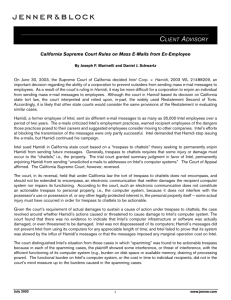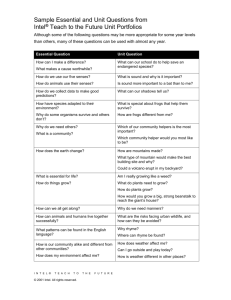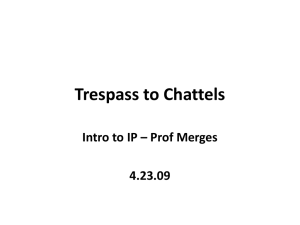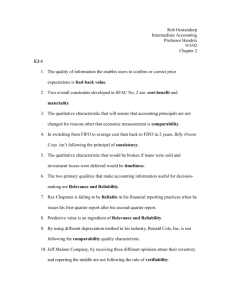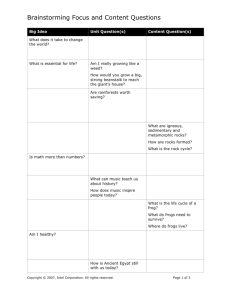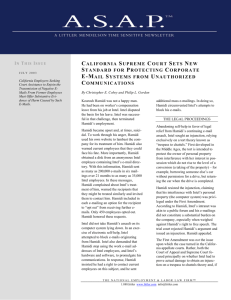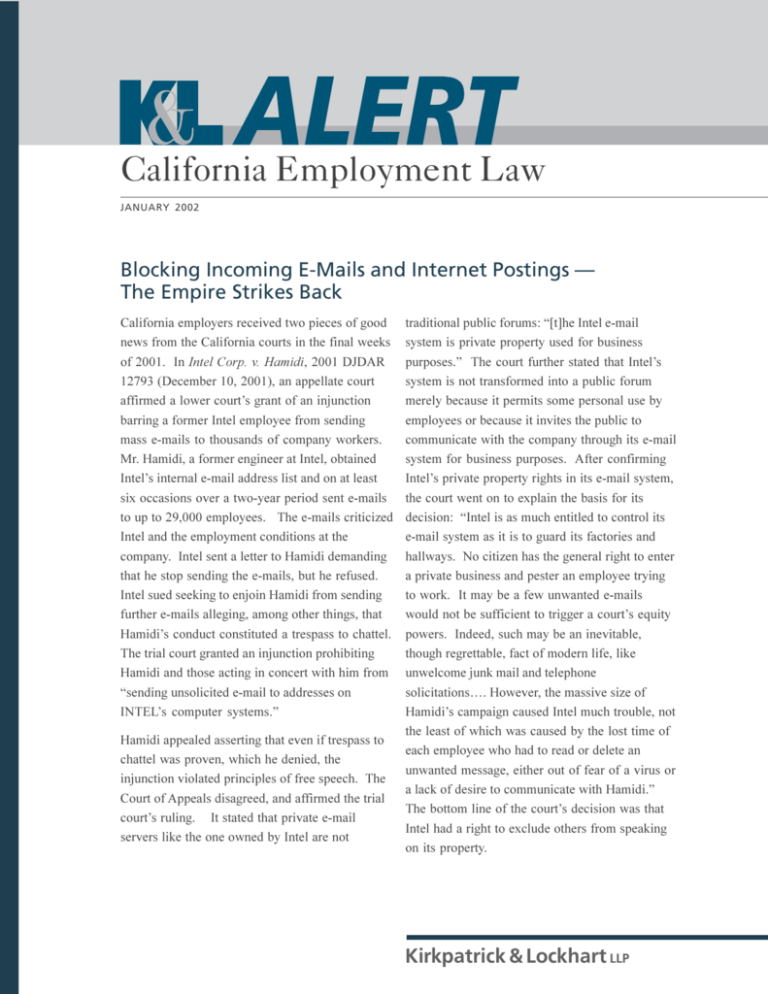
California Employment Law
JANUARY 2002
Blocking Incoming E-Mails and Internet Postings —
The Empire Strikes Back
California employers received two pieces of good
news from the California courts in the final weeks
of 2001. In Intel Corp. v. Hamidi, 2001 DJDAR
12793 (December 10, 2001), an appellate court
affirmed a lower courts grant of an injunction
barring a former Intel employee from sending
mass e-mails to thousands of company workers.
Mr. Hamidi, a former engineer at Intel, obtained
Intels internal e-mail address list and on at least
six occasions over a two-year period sent e-mails
to up to 29,000 employees. The e-mails criticized
Intel and the employment conditions at the
company. Intel sent a letter to Hamidi demanding
that he stop sending the e-mails, but he refused.
Intel sued seeking to enjoin Hamidi from sending
further e-mails alleging, among other things, that
Hamidis conduct constituted a trespass to chattel.
The trial court granted an injunction prohibiting
Hamidi and those acting in concert with him from
sending unsolicited e-mail to addresses on
INTELs computer systems.
Hamidi appealed asserting that even if trespass to
chattel was proven, which he denied, the
injunction violated principles of free speech. The
Court of Appeals disagreed, and affirmed the trial
courts ruling. It stated that private e-mail
servers like the one owned by Intel are not
traditional public forums: [t]he Intel e-mail
system is private property used for business
purposes. The court further stated that Intels
system is not transformed into a public forum
merely because it permits some personal use by
employees or because it invites the public to
communicate with the company through its e-mail
system for business purposes. After confirming
Intels private property rights in its e-mail system,
the court went on to explain the basis for its
decision: Intel is as much entitled to control its
e-mail system as it is to guard its factories and
hallways. No citizen has the general right to enter
a private business and pester an employee trying
to work. It may be a few unwanted e-mails
would not be sufficient to trigger a courts equity
powers. Indeed, such may be an inevitable,
though regrettable, fact of modern life, like
unwelcome junk mail and telephone
solicitations
. However, the massive size of
Hamidis campaign caused Intel much trouble, not
the least of which was caused by the lost time of
each employee who had to read or delete an
unwanted message, either out of fear of a virus or
a lack of desire to communicate with Hamidi.
The bottom line of the courts decision was that
Intel had a right to exclude others from speaking
on its property.
Kirkpatrick & Lockhart LLP
In the other case decided in December, Varian
Medical Systems v. Delfino, Case No. 780187
(Santa Clara County), a jury found that two
research scientists had defamed their former
bosses and employer by posting defamatory
comments on Internet message boards. The
company alleged that the former employeedefendants posted more than 13,000 messages
and also sought to impersonate others in
messages. The messages apparently included
calling former bosses liars, accusing them of
having extramarital affairs, of being homophobic
and incompetent, and accusing the company of
videotaping children and others inside a company
bathroom and listing information concerning
company executives wealth, where they lived and
where their children could be located. The case
appears to be the first such corporate lawsuit to
actually go to trial. The jury awarded the
plaintiffs $425,000 in damages, and found that the
defendants acted with malice, fraud and
oppression, thereby setting the stage for a further
award of punitive damages. The judge also issued
a permanent injunction barring the defendants
from posting messages regarding certain specific
subjects in the future. The defendants have said
they will appeal.
These two December court decisions make clear
that both judges and juries are willing to put limits
on how far disgruntled former employees can go
in their use of electronic communications to
attack their former employers and bosses. The
cases also demonstrate that employers are
becoming more aggressive in monitoring
cyberspace and protecting their rights to be free
from unwanted electronic intrusions and
defamatory publications. In fact, many
employers have already established electronic
communication policies for employees that notify
them that the company monitors and reviews email and Internet use on company equipment and
systems. It is likely that these cases represent the
beginning of what will be an ongoing battle
between employers and former/current employees
over the rights to use electronic communications
and the Internet to deliver and receive
controversial messages and other information.
PAUL W SWEENEY, JR
psweeney@kl.com
310.552.5055
SM
Kirkpatrick & Lockhart LLP
Challenge us.
SM
BOSTON
l
DALLAS
l
HARRISBURG
l
LOS ANGELES
l
MIAMI
l
NEWARK
l
NEW YORK
l
PITTSBURGH
l
SAN FRANCISCO
l
WASHINGTON
.........................................................................................................................................................
This publication/newsletter is for informational purposes and does not contain or convey legal advice. The information herein
should not be used or relied upon in regard to any particular facts or circumstances without first consulting with a lawyer.
© 2002 KIRKPATRICK & LOCKHART LLP. ALL RIGHTS RESERVED.


